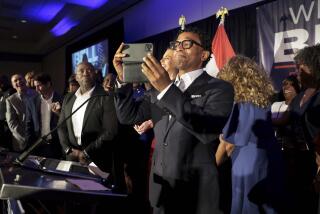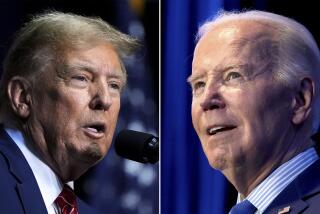Big Day
- Share via
For all the complaining about the experiment known as Super Tuesday, the regional Southern primary produced some dramatic results. The irony is that the Democrats conceived of Super Tuesday as a means of producing a conservative-to-moderate Democratic presidential nomineewho could unite the party and carry the South to victory in the fall election. Super Tuesday seemed to produce a nominee, all right, but it was a Republican--Vice President George Bush.
The stop-Bush campaign will begin in earnest now, but such efforts rarely succeed. Kansas Sen. Bob Dole’s campaign has been an organizational disaster, and Dole has yet to seize on an issue that can hurt Bush or make Dole a preferable alternative. Bush seems to do well merely by being Ronald Reagan’s vice president and heir apparent, wherever the President is popular. Iowa proved to be the exception rather than the rule.
Also, GOP voters exercised good judgment by shunning the bizarre political views of former television evangelist Pat Robertson.
For Democrats, it was a big day for Massachusetts Gov. Michael S. Dukakis, Jesse Jackson and Sen. Albert Gore Jr. of Tennessee and a disaster for Rep. Richard A. Gephardt of Missouri. Perceived as a Northern liberal, Dukakis demonstrated broad support by winning the two biggest states that bracket the Old South--Florida and Texas. It is clear now that the Democratic contest will go all the way to the convention in Atlanta in July. Dukakis is the front-runner in delegate votes, and has to be considered now as the favorite to win the Democratic nomination. Four months is a long time in a political campaign, however, with a high potential for the unexpected.
Gore defied conventional wisdom by ignoring Iowa and New Hampshire and concentrating on his home Southern territory, attempting to capitalize on the original design of Super Tuesday. The gamble paid off, to the considerable surprise of many of the experts. Now Gore will have to do what he opted not to do in Iowa and in New Hampshire: Demonstrate that he can generate support elsewhere in the nation. It will be an uphill task.
Gore’s impressive showing had the beneficial side effect of piercing Gephardt’s bubble. Gephardt was a Washington Establishment insider who suddenly transformed himself into a country-boy populist fighter attempting to exploit a dangerous protectionist trade policy. As Gephardt said, a politician may be admired for changing some of his positions to meet the times or altered conditions. But Gephardt’s wholesale overhaul of thinking coincided too neatly with his desire to become a salable candidate.
The most dramatic development of Super Tuesday and the entire political-primary season may be the evolution of Jesse Jackson from the complaining gadfly of the 1984 Democratic contest into a formidable mainstream Democratic presidential candidate. No longer should Jackson be put into a special box of his own, as the black candidate. While Jackson’s success came mostly from blacks, white voters contributed to his margin of victory in several Southern states. Jackson polled 13% of the Democratic vote in Rhode Island, where only 2% of the population is black. He was the runner-up in Idaho and a strong third in Nevada.
As Jackson notes, it was only 23 years ago that civil-rights demonstrators were beaten by police while attempting to march from Selma to Montgomery, Ala., in a voting-rights demonstration. They suffered broken bones and spilled blood to gain access to the ballot box. On Tuesday, Jackson won the Alabama primary. And now the candidates head for Illinois, where the old political bosses had their last hurrah at the 1968 Democratic National Convention--with the help of police batons.
Super Tuesday was a big day for Bush, Jackson, Dukakis and Gore. As an experiment in the democratic process, Super Tuesday was not a bad day for democracy in America.
More to Read
Get the L.A. Times Politics newsletter
Deeply reported insights into legislation, politics and policy from Sacramento, Washington and beyond. In your inbox twice per week.
You may occasionally receive promotional content from the Los Angeles Times.










